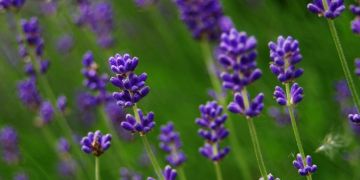Main active ingredients
The flowers are the main supplier of lavender oil, which is how the properties are extracted from the plant. The main active ingredients in lavender are 51% linalool and 35% linalyl acetate. Linalool is a terpene alcohol that is responsible for the strong floral scent of lavender.
Health Benefits of Lavender
Depression
Holistic practitioners have often advised that lavender oil is a healthy alternative to prescription medications to treat depression and anxiety disorders. In 2009, The International Journal of Phytotherapy and Phytopharmacology published a report in which a double-blind study was performed to investigate lavender as an alternative to benzodiazepine. The six-week study, compared larazapam; a common medication prescribed for depression to silexan; a lavender oil capsule. During the study, results were compared using the Hamilton Anxiety Rating Scale. It showed that those taking the lavender capsule showed as much improvement as those taking the lorazepam.
Sleep Aid
Lavender flowers can be crushed and steeped in hot water to create a tea that can be ingested. The flower should steep in the hot water until it cools and then drink the tea. The aroma helps to relax the sleepless person, and help to induce sleep. It is thought to be the combination of warmth, aroma and natural sedative properties from ingesting the tea that all help you to fall asleep.
Relaxant
Lavender oil is used successfully in massage therapy to relax muscles, reduce stress and bring about a sense of well being.
Headaches
Lavender oil can be inhaled deeply into the air passages and this is thought to help relieve headache pain and reduce stress levels.
Topical Uses of Lavender
Rashes and Skin Problems
Lavender oil has healing and soothing properties. It has been reported that those who apply lavender oil to burns will see only slight marking of the skin after two days of treatment. They report smaller scabs and almost no scarring.
Bug Repellant
Lavender oil can be used to repel mosquitoes. Mosquitoes and other bugs do not like the scent and will steer clear of those with the fragrance. This lowers the chance of mosquitoes biting a human and transferring West Nile virus or Equine Encephalitis and other viruses and diseases.
Sprains and Joint Pain
Many people who suffer from sprains and joint pain rub lavender into the skin over the site of the pain and feel improvement. The lavender oil helps the pain become less noticeable and relieves the swelling.
How to Benefit from Lavender
Inhalation
In bath water, aromatherapy machines or cool mist inhalers, lavender can provide insomnia relief, pain relief and treat circulation problems.
Safety Concerns
Lavender can be ingested in very small amounts but people should exercise caution. Lavender can have negative side effects. It can bring on headaches, increased appetite and cause constipation. Pregnant women and young boys should avoid lavender since it can often affect hormones. It's thought to cause gynecomastia in young boys before they hit puberty. It suppresses the male hormones. Some dispute the claim that lavender oil is a direct link in the cause of gynecomastia.
Drug Combinations Lavender causes sleepiness, relaxation and drowsiness, so taking it with other sedatives can be dangerous. It will cause severe sleepiness. Depressants and sedatives should not be combined with lavender. Chloral Hydrate can also cause serious drowsiness when taken with lavender. It should not be ingested in combination with other medications.
The concentrated extract of Lavender essential oil should be considered for topical use or inhalation only and not ingested at all.





